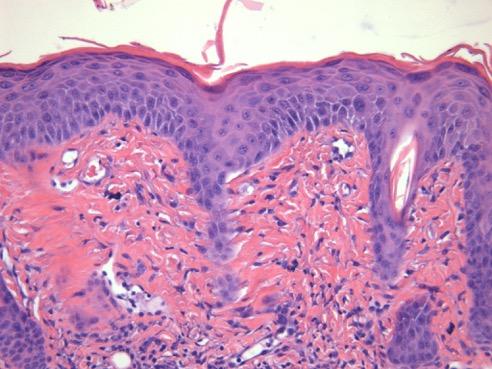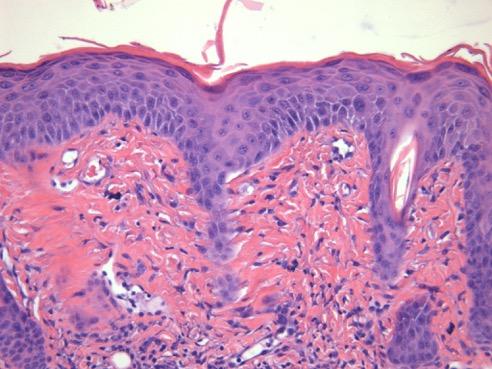
Credit: Case Western Reserve University School of Medicine
Psoriasis is well-known for causing too many skin cells on elbows, knees, and across the body, but people living with psoriasis may also be at an increased risk of heart disease. Effects of overactive immune cells in the skin can spread system-wide and inflame arteries, causing heart attacks and strokes. Treatment of psoriasis and its deadly comorbidities costs an estimated $135 billion annually in the United States, and up to $26,000 per patient, according to the National Psoriasis Foundation. For the 1 in 50 people worldwide living with psoriasis, there is an urgent need to understand how painful, thickened skin can lead to such fatal complications.
Two new studies out of Case Western Reserve University School of Medicine describe how the inflammatory response to psoriasis can alter levels of several immune system molecules, ultimately increasing a person's risk of thrombosis, which can include fatal blood clots.
The studies intersect at a particular molecule called interleukin 6, or IL-6. Psoriasis patients have high levels of IL-6 in their skin, and researchers thought it might be causing the disease or its cardiovascular comorbidities. Patients with congestive heart failure also have high blood levels of IL-6. The molecule is known for triggering overactive immune responses in the skin, like the one that causes overproduction of skin cells during psoriasis.
"We wanted to pursue the mechanisms by which skin inflammation contributes to cardiovascular disease," said Nicole Ward, PhD, associate professor of dermatology at Case Western Reserve University School of Medicine. "In multiple mouse models, we showed removing IL-6 reduced cardiovascular risk, but did not get rid of psoriasis unless combined with other interventions."
In psoriasis clinical trials, blocking IL-6 hasn't been successful. Trial results show IL-6 inhibitors don't reliably improve skin, and can even cause spontaneous psoriasis in people who didn't have it before. Said Ward, "Eliminating this one molecule just isn't good enough."
In a recent study published in the Journal of Clinical Investigation Insight, Ward turned her attention to a protein called MRP14, which has been used to predict heart attack risk in certain populations. People with autoimmune diseases like psoriasis have high levels of MRP14 in their blood, and the gene encoding MRP14 is located near psoriasis genes. Ward and colleagues suspected MRP14 could be contributing to both skin inflammation and cardiovascular disease comorbidities in psoriasis patients. The researchers deleted the gene encoding MRP14 in mice with psoriasis, hoping it would reduce thrombosis.
"The disappointing result was that after two years of work, it had no effect on skin inflammation or cardiovascular comorbidities," said Ward. "The MRP14-deficient psoriasis mice were completely the same as the regular psoriasis mice – they all had similar levels of skin inflammation and thrombosis."
But in science, negative results are still results. The researchers looked for mechanisms that could explain the findings. The MRP14-deficient psoriasis mice still had lots of IL-6 in their skin, plus two other pro-inflammatory molecules, called IL-23 and IL-17. Ward hypothesized that IL-23 and IL-17 could be part of a "workaround" mechanism in the mice that compensated for a lack of MRP14 and sustained skin inflammation.
"IL-23 and IL-17 are the targets for all the newest psoriasis drugs," said Ward. The two molecules have emerged as critical mediators of autoimmunity, and can be leveraged to improve psoriasis skin. When the researchers blocked these molecules in their genetically modified mice, skin inflammation and thrombosis disappeared. Not only that, IL-6 in the skin went down. Said Ward, "We discovered that blocking IL-23/IL-17 decreased skin-derived IL-6 in MRP14-deficient psoriasis mice and reversed the thrombosis." But, the researchers had decreased IL-6 indirectly, and wanted to see what happened to psoriasis mice when they eliminated IL-6 directly, not via other molecules. "There aren't straightforward approaches available to block IL-6 in mouse models," said Ward. "So we spent months genetically engineering our psoriasis mice to lack the gene encoding IL-6." Using her newly created IL-6-deficient psoriasis animals, she was able to demonstrate that the thrombosis was gone. However, the mice still had psoriasis skin inflammation.
In a second study, published in the Journal of Investigative Dermatology, Ward identified several immune system molecules impacted by the genetic deletion of IL-6 in her psoriasis mice. Said Ward, "We were surprised to see compensatory increases in other pro-inflammatory molecules that we know are critically involved in sustaining skin inflammation. It is possible that these factors also increase in psoriasis patient skin and explain why they do not respond clinically to IL-6 blockade." Similar to her other experiments, the immune system had used a compensatory mechanism to sustain psoriasis-like skin inflammation in mice without IL-6. The IL-6-deficient mice still had psoriasis, just like the patients in the clinical trials.
The team had successfully separated psoriasis and cardiovascular disease outcomes. Ward concluded that while blocking IL-6 may not prevent psoriasis on its own, its levels are central to thrombosis events triggered by skin inflammation. The findings may also help explain how alternative immune system molecules could circumvent certain psoriasis treatments.
"Not everything works all the time in science," said Ward. "You have to dig deep and find something interesting from the experiments that don't work out the way you want them to." The next step for the researchers will be to determine how IL-6 interacts with blood and vessel wall components related to thrombosis. Together, the studies could pave the way for new treatments to lower the risk of heart disease in people living with psoriasis.
###
Funding for the Journal of Clinical Investigation Insight study was provided in part, by The Lozick Discovery Grant, National Psoriasis Foundation, the Murdough Family Center for Psoriasis, the National Institute of Arthritis and Musculoskeletal and Skin Diseases of the National Institutes of Health (P30 AR39750, P50 AR055508, R01 AR063437, R01 AR062546; R21 AR063852, K08 AR060802, R01 AR069071), the National Institute for Heart, Lung and Blood of the National Institutes of Health (R01 HL057506), the A. Alfred Taubman Medical Research Institute, the Kenneth and Frances Eisenberg Emerging Scholar Award and the Babcock Foundation Endowment.
Funding for the Journal of Investigative Dermatology study was provided in part by The Lozick Discovery Grant, the National Psoriasis Foundation, the American Skin Association, the Babcock Foundation Endowment, the Murdough Family Center for Psoriasis, the Kenneth and Frances Eisenberg Emerging Scholar Award of the A. Alfred Taubman Medical Research Institute, and the following grants from the National Institutes of Health: K08 grant AR060802, R01 AR069071, P30 AR39750, R01 AR063437, R01 AR062546, R21 AR063852, and K01 AR064765. Microarray experiments were supported by the Gene Expression & Genotyping Core Facility of the Case Comprehensive Cancer Center (P30 CA043703).
For more information about Case Western Reserve University School of Medicine, please visit: http://case.edu/medicine.
Media Contact
Marc Kaplan
[email protected]
216-368-4692
@cwru
http://www.case.edu
############
Story Source: Materials provided by Scienmag





